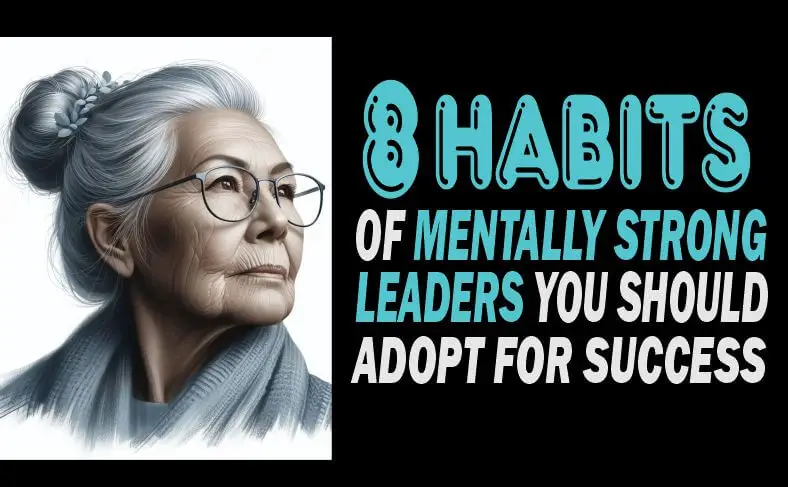When it comes to leadership, there a habits of mentally strong leaders every aspiring leader should strive for.
If you lack mental strength, you will struggle or even fail in whatever leadership role you play.
Mentally strong leaders can overcome challenges, setbacks, and stress with resilience and grace.
They possess a unique set of habits that set them apart from their peers and allow them to achieve their goals with confidence and determination.
At one time or another, you find yourself in a leadership position either at work, in the family, or any of the other places in society where you are required to show leadership skills and record success.
So, it’s good to be prepared by following the following tips to improve.
Here are 7 habits of mentally strong leaders that you would want to adopt to replicate the same success they are known for.
Related: What is Mental Strength and Toughness?
Why You Must Adopt the Habits of Mentally Strong Leaders
You should acquire the habits of mentally strong leaders because they will speed up your personal and professional growth.
By replicating these habits, you can learn to cope with challenges, make helpful decisions under pressure, and maintain a positive mindset.
Also, these habits can help improve communication skills, build stronger relationships, and inspire others to reach their full potential.
Related: Do the Best Leaders Rely on their Intuition?
1. Vulnerability and Authenticity for Mental Strength in Leadership
While being stoic and appearing unruffled is good in some situations, showing vulnerability makes you human enough.
Mentally strong leaders are not afraid to show they can fail, need help, or make mistakes.
Vulnerability and genuineness mirror you into the lives of subordinates and they see themselves in you.
They understand that being open and honest about their feelings and experiences allows them to connect with their teams on a deeper level and sustain trust and respect.
How to Adopt Vulnerability and Genuineness
To adopt vulnerability, you should always be genuine and you have to go about it naturally.
Being honest and genuine in your communication with others is where to start.
Share your thoughts and emotions openly, and encourage your team to do the same.
When you create a culture of genuineness, you build stronger relationships and boost morale within your organization or whatever cycle you operate.
2. Self-awareness in Leadership
Self-awareness, the pivot of emotional intelligence is a key trait of mental strength.
It is the ability to recognize and identify emotions, and thoughts and how they influence behaviour.
Leaders who are mentally fortified can identify their strengths and weaknesses, as well as their emotional triggers and biases.
How to Adopt Self-awareness
To become self-aware, you must reflect on your thoughts, actions, and decisions.
Be sensitive to people’s opinions about you and be ready to adjust your behaviour.
You must not be rigid to change especially as it concerns your thoughts and how you allow them to dictate how you react and behave.

3. Adaptability and Resilience
Being adaptable and resilient is a function of mental strength that eludes many but mentally rugged leaders.
Such leaders can adapt to change and overcome setbacks with utmost resilience.
I have seen some people who give up at the slightest change of routine or when there is a tougher situation to deal with, but I have also seen people, especially leaders who adapt to whatever situation, so far it guarantees growth.
Challenges are their training for and learning and they never fail to seize the opportunity.
How to be Adaptable and Resilient in Your Leadership Journey
To become resilient and adaptable, embrace uncertainty and step outside of your comfort zone.
Take on new challenges and projects that push you out of your routine and force you to stretch your limits.
There is discomfort before success and you have to show all working.
Practice mindfulness and stress management techniques to build your resilience and cope with adversity effectively.
By staying adaptable and resilient, you will set yourself up for success in any situation.
Related: Understanding the Transformational Leadership Style
4. Empathy and Compassion in Mentally Strong Leaders
Empathy and compassion are qualities mentally strong leaders exude.
With empathy, you feel the emotions of others through intuition, and understanding of social cues and body language, and with compassion, you can respond accordingly by showing concern and benevolence.
Leaders with mental strength can connect with others on a personal level and show genuine care and concern for their well-being.
How to Adopt Empathy and Compassion in Leadership
Pay attention to silent cues people unconsciously give off.
Ask questions that betray people’s hidden emotions.
Seek to understand the perspectives and emotions of those around you.
Take the time to build relationships and appreciate the contribution of team members.
Make the environment friendly for everyone to feel free to participate and feel valued and respected no matter how small the circle is.
Showing empathy and compassion is one of the key mental strength people ignore, but establishes trust, loyalty, and the kind of relationship that everyone wants.
Related: The Four Types of Leadership
5. A Growth Mindset for Mentally Strong Leaders
A growth mindset is anchored on mental strength which every leader possesses.
If you aspire to be a resilient leader, you should believe your abilities and intelligence can be developed through effort and perseverance.
You are not afraid to take on new challenges and of course, learn from your mistakes.
How to Exude a Growth Mindset
To develop this habit, you must embrace the mindset of progressive growth and see hurdles as learning opportunities.
Set goals for yourself and your team, and encourage a culture of continuous improvement and innovation with rewards after each milestone.
6. Self-care
Mentally strong leaders take action to improve and take care of their physical and mental health.
They prioritize in maintenance of their performance and effectiveness.
They achieve this by regular exercise, getting quality sleep, and eating an appropriate and healthy diet for their body to be at optimum functioning.
How to Adopt Self-care
Make it a habit to exercise, balance your diet, set boundaries, and delegate tasks to avoid overwhelming yourself.
Also, mindfulness helps in dousing stress and staying grounded amidst challenges.
7. A Culture of Collaboration in Mentally Strong Leaders
Mentally strong leaders prop their teams to take ownership of their work and imbibe the ability to make decisions independent decisions.
They hone a culture of joining forces together and creating the trust needed.
This trust gives everyone a sense of importance and the assurance that their effort counts and is acknowledged.
This attitude also creates a healthy relationship between leaders and their subordinates instead of the traditional silently frosty relationship where leaders are feared and communication is only restricted to tasks.
How to Develop and Maintain a Culture of Collaboration
To develop and sustain a collaborative team, delegate tasks to team members and encourage them to take responsibility as subleaders in their roles.
Be clear in your instructions, guidance, and support but make room for autonomy to be expressed by allowing the team players to solve problems on their own.
Also, don’t forget to make the environment friendly enough for seamless feedback.
8. Confidence in Leadership
Confidence is a pillar in the habits of mentally strong leaders, as it helps them to make decisions and take risks without batting an eyelid.
This habit is a must for every leader to assert himself and take charge of his role with authority.
Without confidence, you will become a pushover leader who will become a failure.
How to Adopt Confidence
To adopt confidence, as a leader, you must first believe in yourself and the abilities you have.
Of course, you have strengths and weaknesses, but you should focus on your strengths, set goals and celebrate your milestones.
Frequently Asked Questions
What are the habits of a strong-minded person?
Mentally strong people have a positive outlook in life, they set goals and achieve them, take responsibility, overcome challenges, and put self-care first to maintain resilience in challenging times.
What habits build mental strength?
Being resilient, self-awareness, facing challenges pushing personal limits to overcome adversities, and building confidence.
How to be a mental beast?
Putting mental health first, self-care, going after goals that are realistic, facing challenges, and learning from failures will make you a mental beast.
How do you make someone mentally tough?
Give support and encourage them to take up challenges. Prop them to step out of their comfort and seek competition that will make them yearn for growth.
Final Words
These habits explained above are the secret habits of mentally strong leaders.
These habits are very important for achieving success and leading with confidence and resilience towards achieving the set goals.
By being vulnerable and showing genuineness, leaders can establish trust and the cohesion needed for a healthy environment.
Also, being self-aware and adaptable helps mentally strong leaders to show empathy and identify situations where to be compassionate.
References:
- https://leadlivelove.blog/habits-of-effective-leaders/
- https://www.entrepreneur.com/leadership/7-habits-to-make-you-a-better-leader-and-give-you-an-edge/418196
- https://www.gcmnigeria.org/en/train-and-grow/leadership-training/leading-a-team/seven-habits-of-team-leaders.html
Pious Clements is the insightful voice behind "The Conducts of Life" blog, where he writes about life ethics, self-development, life mastery, and the dynamics of people and society.
With a profound understanding of human behaviuor and societal dynamics, Pious offers thought-provoking perspectives on ethical living and personal growth.
Through engaging narratives and astute observations, he inspires readers to navigate life's complexities with wisdom and integrity, encouraging a deeper understanding of the human experience and our place within society.
